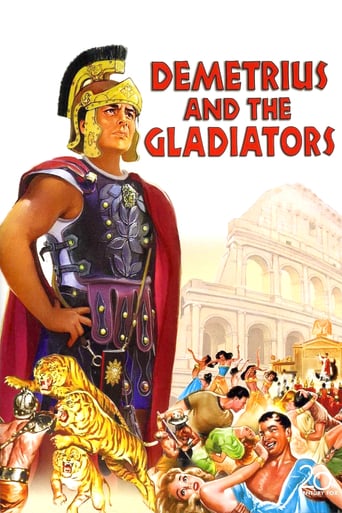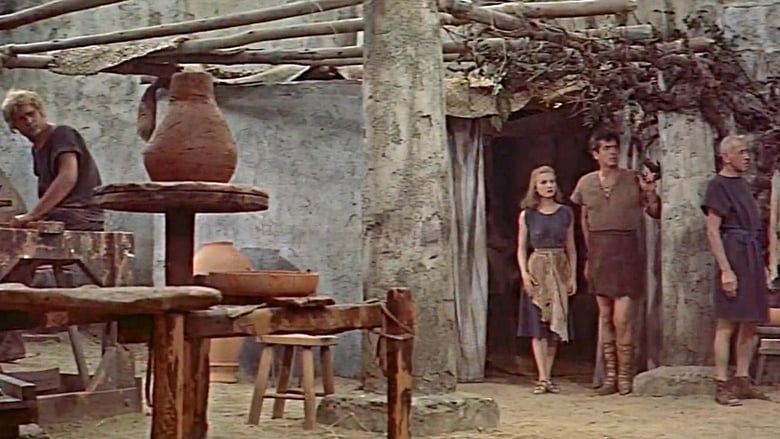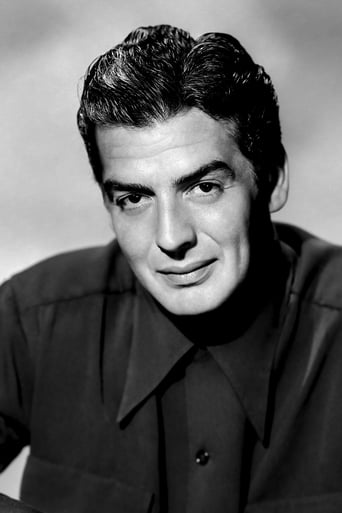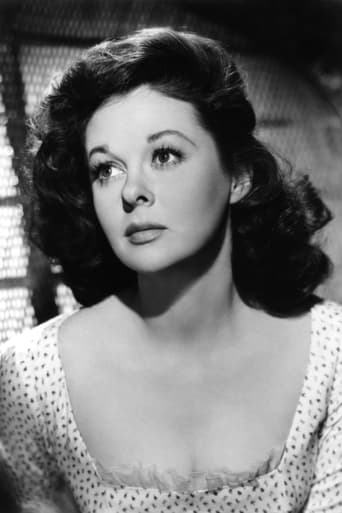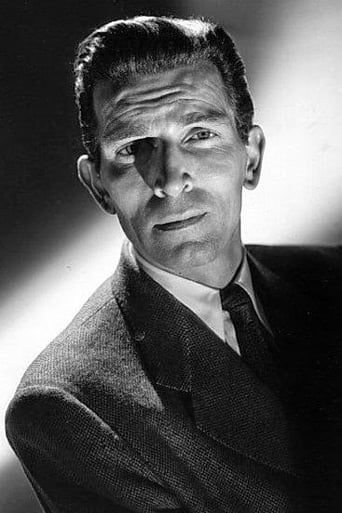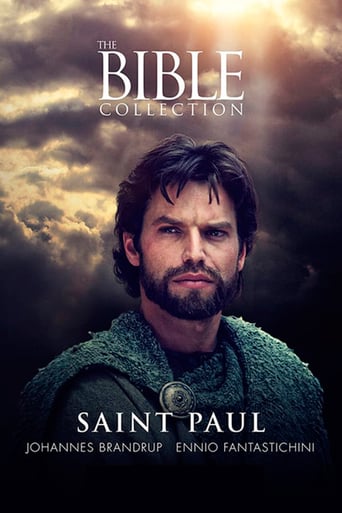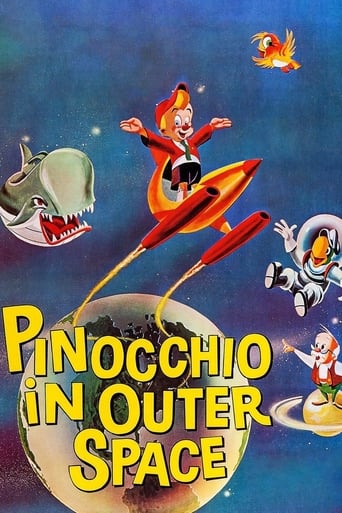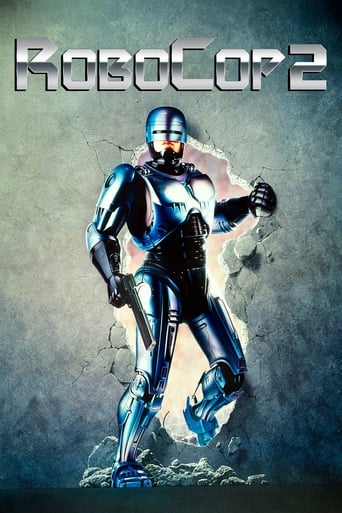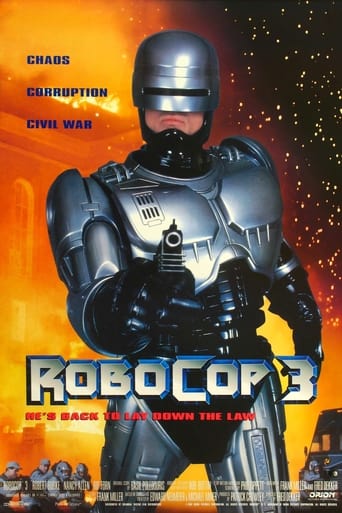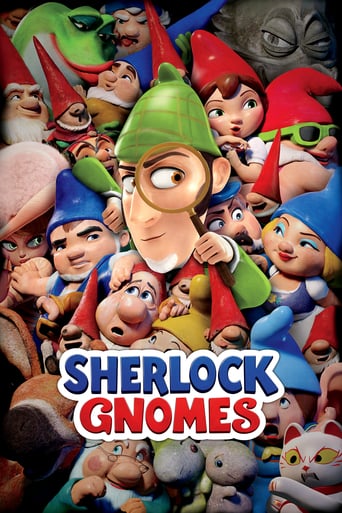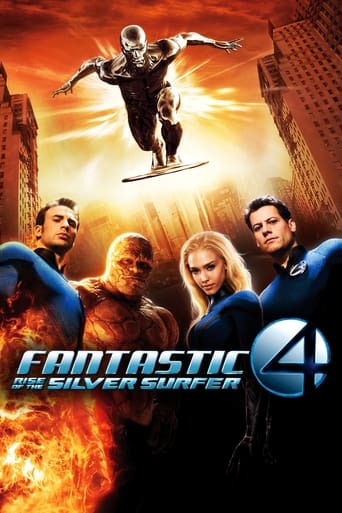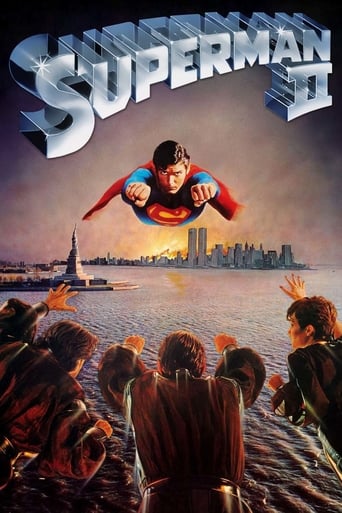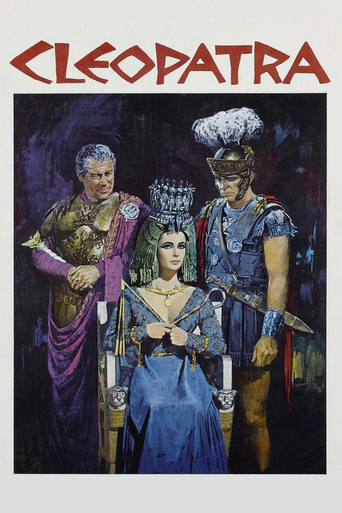Demetrius and the Gladiators (1954)
The story picks up at the point where "The Robe" ends, following the martyrdom of Diana and Marcellus. Christ's robe is conveyed to Peter for safe-keeping, but the emperor Caligula wants it back to benefit from its powers. Marcellus' former slave Demetrius seeks to prevent this, and catches the eye of Messalina, wife to Caligula's uncle Claudius. Messalina tempts Demetrius, he winds up fighting in the arena, and wavers in his faith.
Watch Trailer
Cast


Similar titles

Reviews
Save your money for something good and enjoyable
Highly Overrated But Still Good
Fresh and Exciting
Fantastic!
This direct sequel to The Robe starts literally where the previous movie ends, starting out with the last 2 minutes of The Robe.Even though the Roman guard and his girlfriend were executed for refusing to renounce Jesus, the slave Demetrius still lives and has faith. His master dies and therefore is sold to be trained as a gladiator. "Are you not entertained?" :)I have 3 rankings for a movie that I give a 10. I loved it, really liked it, or simply liked it. DATG fits in the final category. It's good but not thrilling. I think it's because I put The Robe in category 2, and this didn't hold up to it's predecessor.Still, as a stand alone movie, it's decent and worth watching, but only if you have seen The Robe. If you don't, this will not make much sense.
It's a pretty good story, actually, this sequel to "The Robe". As entertainment, it has plenty to offer. As history, however, it falls flat on its face. The only accuracy in the story of Caligula is that he was assassinated by one of his own guards. He is also played so outrageously hammy that it is hard to take him seriously. Caligula also wasn't the slightest bit concerned with Christians or Jews, and in real life largely ignored them. His successor, Claudius, played here as a fine old Roman gentleman who wished the Christians well at the end, in fact found them and the Jews both to be a bother, and showed them the doors of Rome at every opportunity. (Please note: with the one politically motivated action of Nero, real persecution of Christians did not occur until much later, under the Emperor Diocletian) And let's not forget the Empress Messalina, probably the most notorious loose woman in Roman history, who comes across here as just a cheating wife. But then - hey, I'm a history buff. The point is that despite these little problems, it is still a good movie, and Victor Mature is perfect as the toughened gladiator. It's a classic and still a favorite
Filmed at almost the same time, this film was a fitting sequel to "The Robe," considering it did not have the star power of the earlier film. None the less it loses some of the reverence of the first film, as Demetrius, so passionate a Christian in the first film, seems to give in and give up on it all too quickly in this one. The tie-in of the final scene from "The Robe" as the opening scene to this movie was a good advertising ploy, and the musical score of Franz Waxman melded well with the earlier Newman themes. The powerful insanity of Caligula is once again handled well by Jay Robinson, who brought the character vividly to life, as I remember from my Roman History studies. If the Rome of those days was as charming as depicted in these films, I would not have minded living there and then. The performances of the cast, especially the minor characters, was excellent, although Mature was still awfully stiff in his performance. But a good sequel over all.
The historical epics which were so popular in the fifties and early sixties frequently had a religious theme. Some were based on stories taken directly from the Bible ("The Ten Commandments", "Solomon and Sheba", "King of Kings"), while others tried to convey a Christian message indirectly. Thus the central character of "Spartacus" is treated as a metaphorical Christ-figure, and "The Egyptian" draws parallels between Christianity and the monotheistic religion of Atenism which briefly flourished under the heretical Pharaoh Akhnaten. "Demetrius and the Gladiators" is one of a number of films (the most famous is "Ben Hur", but others include "The Robe", to which "Demetrius" is a sequel, "Quo Vadis" and "The Fall of the Roman Empire") which deal with the early days of the Christian church and its persecution by the Roman emperors. The stories told by such films were normally fictitious, but were set against a background of historical fact. The central character, Demetrius, is a former slave who, after assaulting a soldier who is molesting his girlfriend Lucia, is sentenced to fight in the arena as a gladiator. This causes him difficulties as he is a Christian whose moral code will not permit him to kill another man, even in self-defence. He survives, however, largely because he attracts the attention of Messalina, the wife of Claudius, uncle of the Emperor Caligula. Later, believing that Lucia has accidentally been killed by another gladiator, Demetrius renounces his Christian faith, and fights fiercely, killing the man he believes to have been responsible for her death and several others. His courage and skill with a sword lead to his being made a tribune in the Praetorian Guard, and he becomes Messalina's lover. As in "The Robe", the robe which Christ wore to His crucifixion plays an important part in the film; Caligula wants to get his hands on it because he believes that it has magical powers and that it will give him the secret of eternal life. Several of the epics of this period combined, incongruously, an improving religious message with a good deal of eroticism, with much bare female flesh on display- examples include "Solomon and Sheba", "Esther and the King" and "Salome", where we get to see the famous dance of the seven veils, but it is made clear that, contrary to the Biblical version of the story, Rita Hayworth's character is in fact a virtuous heroine who only is flashing her legs in public in a desperate attempt to save John the Baptist from his fate. There are elements of this strange combination of godliness and sexiness in "Demetrius", but the sexiness is very much downplayed. Messalina's notorious promiscuity is alluded to rather than shown on screen, and the scene between the gladiators and the women brought in to entertain them may be an orgy, but it is a very decorous one. The film-makers were clearly more interested in the element of godliness, and, unlike some films of this type, "Demetrius" raises genuine moral issues about pacifism, non-violence and Christian forgiveness. Demetrius himself is a man who goes through a crisis of faith and abandons his Christian beliefs in favour of an ethic based on revenge and worldly ambition. His conscience, however, is troubled, especially after he is reproached by his old friend St Peter. He is a more complex and interesting figure than many epic heroes, so it is unfortunate that the part was played by Victor Mature, an actor whose success often seemed to owe more to his ruggedly masculine good looks and his virile physique than to his acting technique. Susan Hayward (an actress who could often look bored and listless when asked to play roles that did not interest her) makes a weak Messalina. Neither give their worst performance (in Hayward's case that must surely have been "The Conqueror"), and Mature brings a certain rough sincerity to his part, but I felt that the film might have been improved with other actors in these roles.Nevertheless, there was much I enjoyed about the film. Michael Rennie was appropriately dignified as Peter, played as a sort of ascetic philosopher, although I would agree with the reviewer who pointed out that it would be hard to imagine him ever working as a fisherman. I also liked William Marshall as Glycon, the former African king now forced to fight as a gladiator, who befriends Demetrius. ("Spartacus", a better film than "Demetrius" although it owes something to it, also features a sympathetic black gladiator who befriends the hero). Jay Robinson, who played Caligula, has been criticised by some reviewers for overacting, although I must say I liked his performance. Historians have doubted whether the real Caligula was actually insane, although he was undoubtedly cruel and eccentric, but in the context of this film he is definitely presented as a lunatic, a man who has literally been driven mad by power to the point where he believes himself to be a god. (Not even Hitler went that far). There is an interesting contrast with a modern epic, "Gladiator", in which Joaquin Phoenix plays another tyrannical Roman Emperor, Commodus, as a basically weak and insecure young man. Although Phoenix's performance works well in the context of that particular film, the way the role of Caligula was written called for something quite different- the sort of ranting, over-the-top performance which might be unfashionable now but would have been less controversial in the fifties.Although the standard of the acting is mixed, I generally enjoyed the film. It does not reach the standard of the really great epics, such as "Spartacus" or "Ben-Hur", but it works well on the level of spectacle, with fine sets and costumes and some exciting scenes of gladiatorial combat, and has a more intelligent script than many epics. 7/10

